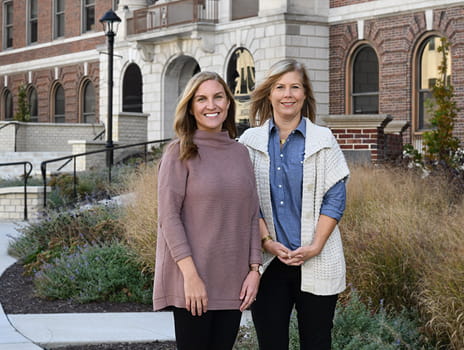- Home
- Research
- Research that Transforms
- Beyond the Bench
- Beyond the Bench 2022
- Mentoring Matters
Mentoring Matters

As a comprehensive cancer center designated by the National Cancer Institute, it is The University of Kansas Cancer Center’s duty to support and train the next generation of scientists and clinicians. A strong mentor partnership can have a profound impact on the trajectory of a young scientist’s career. That is certainly the case for Elly Leavens, PhD, assistant professor in the Department of Population Health.
Centering Community Needs
Dr. Leavens was paired with Nikki Nollen, PhD, in 2019 via the TL1 Trainee Program, which is offered by the Frontiers Clinical and Translational Science Institute (CTSI) at the University of Kansas. The two-year program provides an intensive mentor experience as well as training in clinical and translational research. Together, Dr. Nollen and Dr. Leavens study tobacco cessation in minority groups.
Dr. Nollen is a professor in the Department of Population Health and co-leader of the cancer center’s Cancer Prevention and Control research program. Her research team is one of the only groups in the country exclusively focused on improving tobacco-use treatment outcomes in Black smokers. Dr. Nollen collaborates with community members and organizations to ensure research centers on patient needs.
“It is so important to involve community members in your research,” Dr. Leavens says. “That is one of the most significant things I have learned from working with Dr. Nollen.”
Black Americans tend to smoke fewer cigarettes and start smoking at an older age. Yet they are more likely to die from smoking-related diseases, including cancer. Discoveries from Dr. Nollen’s lab, including findings from her menthol cigarette research, help guide the actions of the Food and Drug Administration and may lead to policies that protect the public from the negative health effects of tobacco.
Dr. Nollen took off my blinders and showed me other ways to look at my research. She opened doors I had never thought to explore. Elly Leavens, PhD
Assistant Professor in the Department of Population Health
Finding Alternatives to Smoking
Dr. Nollen and Dr. Leavens are now more than two years into their partnership. In that time, Dr. Leavens has received two pilot awards from the cancer center. The first examines the addiction potential of e-cigarettes and heated tobacco products relative to cigarettes among current smokers. The goal is to assess whether current smokers may see these less-harmful products as viable alternatives to smoking. The second investigates the short-term health impact of switching smokers with chronic obstructive pulmonary disease (COPD) who are not interested in quitting to e-cigarettes. She successfully leveraged these pilot funds into a career development award from the National Institute on Drug Abuse to study how varying e-cigarette nicotine concentrations impact use and short-term health outcomes among White and Black smokers.
“Dr. Leavens is very driven, very goal-oriented,” Dr. Nollen says. “I’m impressed with what she has accomplished in such a short time.”
Research in the Real World
According to Dr. Leavens, the partnership has helped calibrate her research focus. Thanks to Dr. Nollen’s guidance, Dr. Leavens has homed in on studying novel nicotine delivery systems like e-cigarettes and smokeless tobacco products in the lab setting. She then examines how these discoveries may translate into real-world use patterns of adult smokers over a longer period. According to Dr. Nollen, this focus on lab-based and clinical trial methodologies sets her apart from other researchers studying tobacco regulatory science. Most research is conducted within a silo of the lab or the field.
“Dr. Nollen took off my blinders and showed me other ways to look at my research,” Dr. Leavens says. “She opened doors I had never thought to explore.”